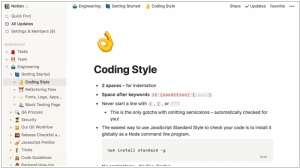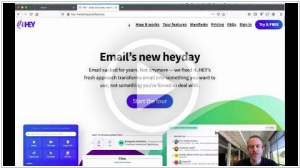Basecamp vs Notion
August 23, 2023 | Author: Adam Levine
12
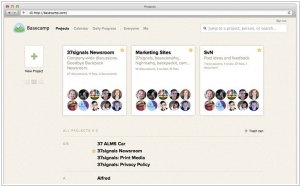
Basecamp tackles project management with a focus on communication and collaboration. Making to-do lists and adding to-do items literally just takes seconds. Basecamp is optimized to make the things you do most often really fast and really easy. Basecamp mobile is especially made for popular mobile devices like iPhone and Android.
Basecamp and Notion are both popular productivity and collaboration tools, but they have different focuses and feature sets. Basecamp is primarily designed as a project management and team collaboration platform, offering features such as to-do lists, file sharing, message boards, and calendar integration. It provides a simple and straightforward workspace, making it easy for teams to communicate and manage projects. On the other hand, Notion is a flexible all-in-one workspace that allows users to create and organize various types of content, including notes, documents, databases, and wikis. Notion's strength lies in its versatility and the ability to customize the workspace to fit individual needs, making it ideal for personal note-taking, knowledge sharing, and project management.
See also: Top 10 Wiki software
See also: Top 10 Wiki software
Basecamp vs Notion in our news:
2024. Notion acquires privacy-focused productivity platform Skiff
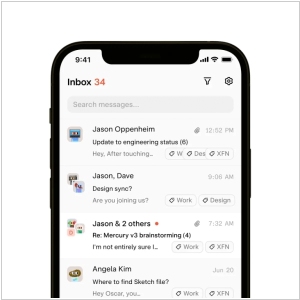
Notion has acquired Skiff, a platform established in 2020 by Andrew Milich and Jason Ginsberg, which specializes in providing end-to-end encrypted file storage, document management, calendar functionalities, and email services. Skiff initially garnered $14.2 million in funding and positioned itself as a secure alternative to Google Docs, expanding its offerings to include productivity solutions like calendars and emails. Skiff announced its integration with Notion on its website, along with the decision to discontinue its services after a transition period of six months. The company assured users that their Skiff accounts would not be automatically converted into Notion accounts but emphasized the ease of exporting or migrating data to other platforms.
2024. Notion launches a stand-alone calendar app
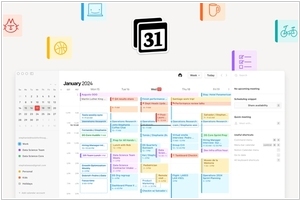
Notion, a widely used platform for note-taking and project management, has introduced a dedicated calendar service, drawing from its acquisition of the well-designed Cron calendar app in 2022. Positioned as a free next-generation iteration of Cron, Notion Calendar incorporates a built-in scheduling tool reminiscent of Calendly and offers optional deep integration with Notion. Accessible on Mac, Windows, iOS, and the web (with an Android app in development), the calendar seamlessly merges work and personal calendars, providing users with a unified view for effective day management. Although Notion has previously featured a calendar view within workspaces, it now integrates with external calendars, starting with Google Calendar. Emphasizing its standalone nature, users can opt for Notion Calendar as a standalone smart calendaring service, but for Notion users integrating it into their workflow, there's the added benefit of attaching Notion docs to calendar events, fostering better preparation and alignment within teams.
2021. Notion acquires India’s Automate.io in push to accelerate product expansion
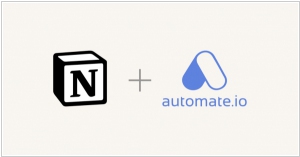
Workplace productivity startup Notion has recently acquired Automate.io, an Indian startup renowned for developing connectivity and integrations with more than 200 services. This acquisition serves as a strategic move for Notion to expedite its product expansion and enhance its appeal to the growing number of individuals and businesses transitioning to digital collaborative tools. With the addition of Automate.io, Notion gains valuable insights into the 200 integrations the Indian startup has built. This knowledge will enable Notion to empower users and enterprises by incorporating their workflows seamlessly into the Notion platform.
2020. Basecamp launches Hey, a hosted email service for neat freaks
Project management software maker Basecamp has introduced an innovative hosted email service named Hey. With Hey, the company aims to tackle the chaos and clutter typically associated with traditional email inboxes. One of its notable features is a built-in screener that prompts users to confirm whether they wish to receive emails from new senders. Upon consent, inbound emails are sorted into different trays. The central "imbox" (short for important box) exclusively contains communications designated as important by the user. Newsletters are organized in a News Feed-style tray called The Feed, where they are conveniently displayed in a partially opened format for casual reading. Additionally, email receipts are neatly arranged in a dedicated inbox view called the Paper Trail, serving as a reference for users.
2020. Online workspace startup Notion raises $50M
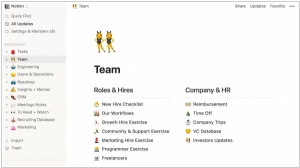
Online workspace startup Notion has secured $50 million in fresh funding, valuing the company at $2 billion. Established in 2016, Notion offers a comprehensive workspace solution encompassing note-taking, task management, wikis, and databases. Its unique proposition lies in consolidating various work applications into a single platform, making it ideal for efficient task and project management. Notably, amidst the global COVID-19 pandemic, Notion's remote work support played a significant role in attracting investors. The company experienced a surge in new customer sign-ups, setting new records, as remote working became the norm due to the pandemic. The exponential growth of remote work in 2020, spurred by COVID-19, has significantly bolstered the user base of remote work tool providers across different industries.
2018. Basecamp adds recurring events and image galleries
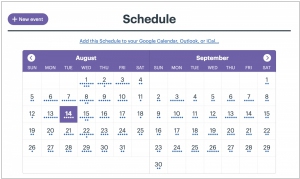
Project management service Basecamp has introduced several exciting new features. The first addition is Recurring events, allowing users to schedule daily, weekly, monthly, and yearly repeating events within Basecamp 3. Users can choose to set the recurrence until a specific date or continue indefinitely. The second feature is Image galleries, which enables users to showcase their work or share photos in visually appealing side-by-side or three-in-a-row layouts. This enhancement makes it easier than ever to present visual content. Lastly, Basecamp introduces Automatic Check-ins, a simple and informal tool extensively utilized for team communication. The entire company can engage in queries such as sharing weekend activities and work updates, while smaller teams like Support can address specific questions related to common issues encountered during the week. These new features enrich the Basecamp experience, enhancing collaboration and streamlining communication within teams.
2018. Basecamp improves client collaboration
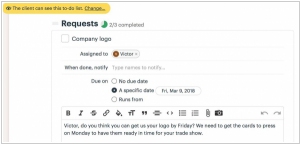
Collaborating with clients in Basecamp has been significantly enhanced, offering an improved experience. The latest updates enable you to effortlessly assign to-dos to clients, share files and folders, schedule events and meetings, engage in Campfire chats, and even automatically ask clients check-in questions. Within a project, all items are now clearly labeled as either "private to our team" or "visible to the client." To avoid any unexpected sharing mishaps and minimize concerns, every item within a project begins as private, accessible only to your team. When you post something new, you have the flexibility to specify whether it should be visible to the client or remain private within your team. These enhancements ensure smoother collaboration and allow for precise control over shared information in Basecamp.
2014. Basecamp app is available for iPad
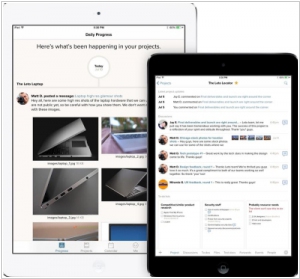
The official app for iPad has been launched by the popular project management service Basecamp, expanding beyond its previous availability only on iPhone and the web for iPad users. This app enables users to conveniently access their projects from anywhere, providing updates on each project's latest news, facilitating participation in discussions and sharing thoughts, and allowing the viewing of team members' progress as they complete tasks and upload files. With all project-related information accessible, users can easily reference documents and make decisions regardless of their location. The app boasts a swift and responsive performance, featuring a clean and well-organized interface.
2014. 37Signals renames to Basecamp, discontinues development of other products

37Signals emerged as one of the pioneers in the SaaS market. In 2004, they introduced Basecamp, a project management service that remains highly popular to this day. It boasts a user base of 15 million individuals and is often regarded as a trailblazer in web-app design. Notably, 37Signals CEO, Jason Fried, is widely recognized, and he has authored books such as Getting Real and ReWork. Jason's profound admiration for small businesses and the startup ethos is evident. Despite Basecamp's remarkable success, he has successfully maintained the startup mentality within the company, employing only 43 individuals. Jason even experimented with scaling back the customer base to control growth. Presently, he has conceived a new idea: to pause the development of other products (including the CRM system Highrise, group chat Campfire, task-manager Ta-Da List, wiki Writeboard, and organizer Backpack) and concentrate all efforts on Basecamp. Moreover, he has decided to rename the company from 37Signals to Basecamp, a concise and elegant title. If you are a user of 37Signals products affected by this decision, there is no need to panic. The products will continue to function and receive support in the future, albeit without further feature updates.
2013. Basecamp launches mobile app for iOS
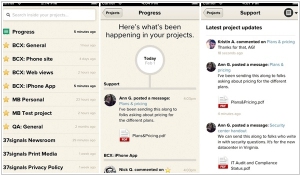
HTML5 has taken a backseat to mobile applications, at least for the time being. Jason Fried, the CEO of the highly popular project management service Basecamp, has always prioritized the effectiveness of his product over following trends or engaging in mere PR stunts. He previously held the belief that focusing on the web interface was the best approach rather than chasing the multitude of mobile platforms. As a result, Basecamp was only available as a web app for mobile devices. However, Jason has recently concluded that a native client would offer greater convenience. As a result, Basecamp is now accessible as a native app for iPhone and iPad. The app is free and showcases the new, visually appealing style of the web version.

